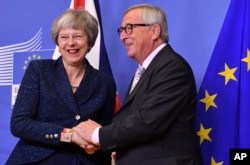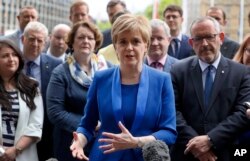British Prime Minister Theresa May announced parliament will hold a vote on December 11 to approve or reject the Brexit deal she negotiated with the European Union.
May warned lawmakers on Monday that Britain will be thrust into the unknown if parliament rejects the deal, as lawmakers from both sides of the political spectrum continued to criticize the agreement.
"There is not a better deal available," May told the House of Commons.
"Our duty as a Parliament over these coming weeks is to examine this deal in detail, to debate it respectfully, to listen to our constituents and decide what is in our national interest,'' she said.
Both critics in May's own Conservative government and opposition parties have threatened to vote against the Brexit deal.
A spokesman for Britain's Labour Party said its leader, Jeremy Corbyn, would "relish a head-to-head debate with May about her botched Brexit deal and the future of our country."
May had suggested in an interview with The Daily Telegraph that she was keen to challenge Corbyn to a television debate about Brexit, as she launches her campaign to pass the deal through Parliament.
European Approval
It took May and 27 other European Union leaders just 40 minutes to sign the Brexit deal on Sunday in Brussels after two years of tortuous negotiations.
However, as they endorsed the 585-page agreement, and a 26-page accompanying political declaration that sets out the parameters of negotiating a possible free trade deal between Britain and the European Union, powerful political foes in London plotted strategies to undo it.
There is little evidence Britain's embattled prime minister will have sufficient support to win legislative endorsement of the deal in a House of Commons vote next month.
That was clearly on the minds of European Commission officials Sunday as EU leaders gave their backing to the terms of Britain's split from Brussels after 44 years of membership.
European Commission President Jean-Claude Juncker warned that Britain cannot expect to get a better deal, if its parliament rejects the agreement. "Now it is time for everybody to take their responsibilities, everybody," he said.
"This is the deal, it's the best deal possible and the EU will not change its fundamental position when it comes to this issue, so I do think the British parliament, because this is a wise parliament, will ratify this deal," he added.
German Chancellor Angela Merkel said she was relieved the bloc "had made it to this point."She said, "I think we managed to make a diplomatic piece of art."
Dutch Prime Minister Mark Rutte warned British lawmakers that no better deal was on offer from the European Union, urging them to back the agreements.
“If I would live in the UK I would say yes to this, I would say that this is very much acceptable to the United Kingdom,” Rutte said, because the deal “limited the impact of Brexit while balancing the vote to leave.” In a bid to help the prime minister, he said May had “fought very hard” and now there was “an acceptable deal on the table.”
“You know I hate [Brexit], but it is a given,” he told reporters. “No one is a victor here today, nobody is winning, we are all losing.”
Opposition in Britain
Maybe it is a "given" in Brussels, but in Britain that is another matter altogether.
Both Remainers and Leavers in the British Parliament are warning that May doesn't have the necessary support with the all the opposition parties lined up against the deal and as many as 100 lawmakers, Remainers and Leavers among them, from May's ruling Conservatives pledging to vote against it as well.
Iain Duncan Smith, a former Conservative leader, said he would continue to oppose the deal because it "cedes huge amounts of power" to the European Union.
In Scotland, first minister and leader of the Scottish Nationalist Party Nicola Sturgeon said, "This is a bad deal, driven by the PM's self-defeating red lines and continual pandering to the right of her own party.Parliament should reject it and back a better alternative."
She wants a second Britain-wide referendum, like a majority of Britons, according to recent opinion polls.
The agreement calls for Britain to stay in the bloc's customs union and largely in the EU single market, without the power to influence the rules, regulations and laws it will be obliged to obey for a 21-month-long transition period following formal withdrawal on March 29. The deal would allow an extension of "up to one or two years" should the negotiations over "the future relationship" not be completed by the end of 2020.
May is campaigning to sell the agreement to the British public, hoping she can build enough support in the wider country to pressure the House of Commons to endorse the deal.European Parliament approval is almost certain.
In an open letter to the British public published Sunday, May promised to campaign "with my heart and soul to win that vote and to deliver this Brexit deal. "If she is unable to do so, Britain would be plunged into what May herself has called, "deep and grave uncertainty."
Her aides say she is banking on the "fear factor," daring the House of Commons to vote down a deal which if rejected would leave Britain most likely crashing out of the bloc, its largest trading partner, without any agreements, which would be costly economically and would almost certainly push the country into recession.
Ominously, the Northern Ireland party, the Democratic Unionist Party, whose 10 lawmakers May's minority government relies on to remain in power, says it will vote against the deal.And DUP leader Arlene Foster warned Sunday she is ready to collapse the government to block a deal that would see Northern Ireland treated differently than the rest of Britain.
And senior Labour lawmaker Tony Lloyd said there was a "coalition of the willing" in the Parliament ready to reject May's deal and support a softer Brexit. So, if the deal is voted down, what then? A vote against could trigger a general election, a second Brexit referendum or even more negotiations, despite Brussels' threat there can be no other deal.




